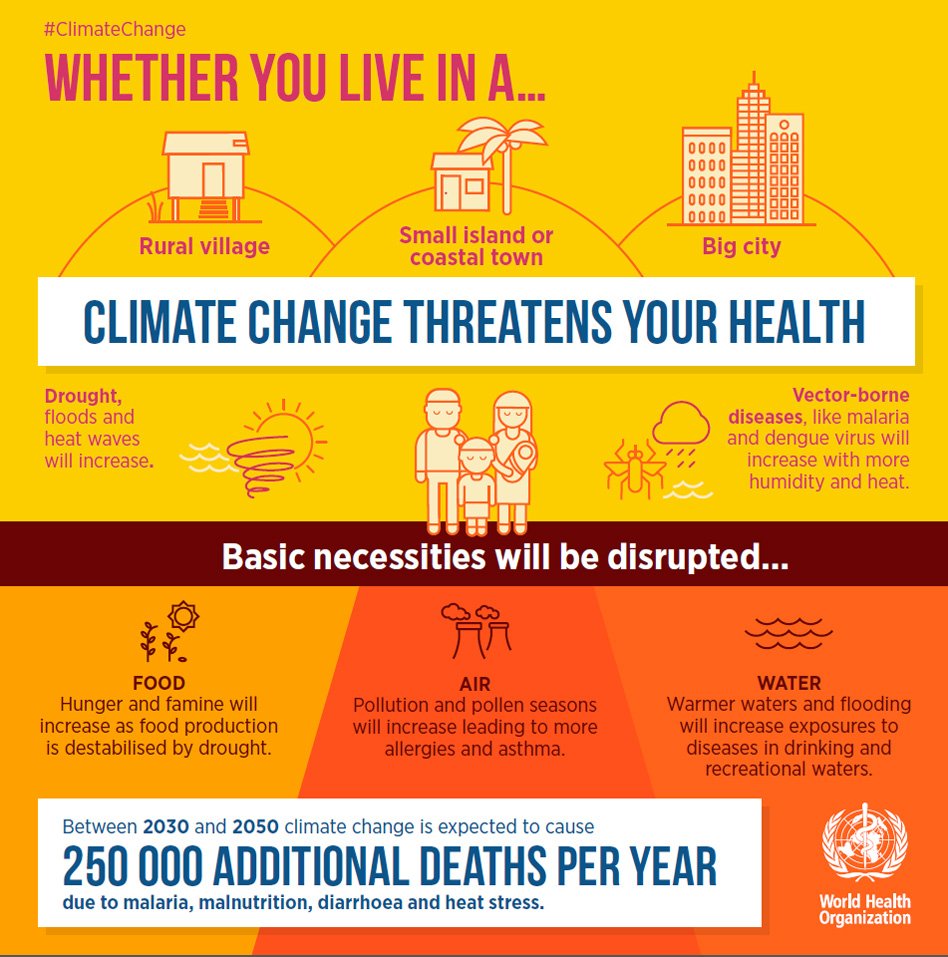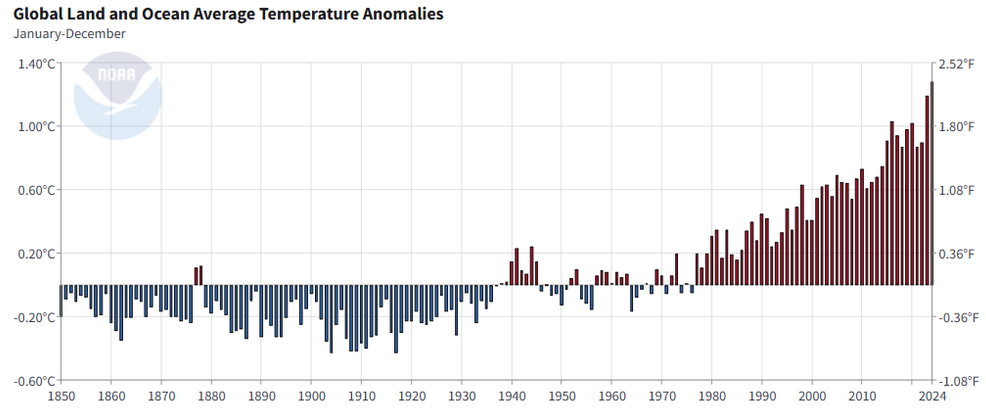Climate change and Public Health
Résumé de section
-
Welcome to this module, which covers some of the Public Health aspects of climate change and its impact on populations.
This course, open to everyone, aims to inform about the dangers of climate change to Public Health and spur us to action. Please share with others.Note: if you want to gain a certificate for completing this course, you will have to create an account and log in as a student.

This work is licensed under a Creative Commons Attribution 4.0 International License.A few facts first:
As the Global Climate and Health Alliance has said:
"Climate change poses an urgent threat to human health, and the impacts are already being felt around the world. Without transformative system change, they will become dramatically worse, particularly in the poorest regions - which have contributed least to the causes of climate change.
The health sector everywhere needs to play a central role in addressing climate change--the greatest health threat of the 21st century. We must reduce healthcare's climate footprint, make our health systems more resilient, and most importantly advocate for a fundamental shift in energy, transport and agriculture policies. Our task is to end our dependency on fossil fuels, a move that can help tackle both climate change and the rise in non-communicable diseases such as diabetes, cancer, heart disease, stroke, and asthma."The Lancet has called climate change "the biggest global health threat of the 21st century” and in its 2015 Commission on Climate Change and Health, while commenting that "The implications of climate change for a global population of 9 billion people threatens to undermine the last half century of gains in development and global health. The direct effects of climate change include increased heat stress, floods, drought, and increased frequency of intense storms, with the indirect threatening population health through adverse changes in air pollution, the spread of disease vectors, food insecurity and under-nutrition, displacement, and mental ill health" also says "The central finding from the Commission's work is that tackling climate change could be the greatest global health opportunity of the 21st century."
10 years later, the Lancet Countdown in its 2025 report:
"exposes a world in turmoil. Climate change threats to human health and survival continue breaking concerning records, while delayed—and oftentimes reversed— actions exacerbate the threats on health and survival. People worldwide are facing unprecedented climate change health risks. Of the 20 indicators monitoring climate change-related health risks, 12 (60%) reached unprecedented levels in the latest year of data."
You might also like to read the current issue of the Lancet Planetary Health. Planetary health "aims not only to investigate the effects of environmental change on human health, but also to study the political, economic, and social systems that govern those effects."
From the World Health Organisation:

The US Environmental Protection Agency has made a number of key points:
- Countries around the world will likely face climate change impacts that affect a wide variety of sectors, from water resources to human health to ecosystems.
- Impacts will vary by region and by population.
- Many people in developing countries are more vulnerable to climate change impacts than people in developed countries.
- Impacts across the globe can have national security implications for the United States and other nations.
Updates: The evidence on climate change is updated all the time. Please take the time to update yourself on recent developments. For example, look at 10 Big Findings from the 2023 IPCC Report on Climate Change where you will see: 'emissions have climbed steadily over the past decade, reaching 59 gigatonnes of carbon dioxide equivalent (GtCO2e) in 2019 — approximately 12% higher than in 2010 and 54% greater than in 1990.' So there is a long way to go!
Other courses: The SDG Academy has a number of 'Free, open educational resources from the world’s leading experts on sustainable development'. They go beyond climate change, but please take a look.
Ways to navigate the course: Click on the hyperlinks to take you to read a resource.
This course is for self study, although we have posted some Reflections as discussion questions to get you thinking - you can post to these if you wish.
There is a quiz to allow you to review your understanding of some of the concepts covered. You can earn a Certificate of Completion if you view each of the Resources pages and post a reflection in each Topic and pass the quiz (see Topic 5 at the end).
NOTE: you can only gain a certificate if you are enrolled as a student (also free). If you have not already done so, you can enrol if you click on Home next to the logo top of page.
The course was prepared by Professor Dick Heller, with input from Professors Peter Sainsbury and Lynne Madden as well as Dr John Van Der Kallen.
-
Headline competence (learning outcome): After completing this Topic you should be able to:
Understand the key historical and projected estimates of climate change, and the human influence on climate change.
Before we get into the main resources in this section, here is an introduction to the introduction to set the scene!
The year 2024 was the warmest since records began. Here is a graph from the NOAA National Centers for Environmental Information

You can also get a great deal of information from the NASA website.
-
What is the best piece of evidence would you can find that would convince your colleagues that human factors have influenced climate change?
-
Headline competence (learning outcome): After completing this Topic you should be able to:
Understand the magnitude of the potential health problem for your local, national and global populations from climate change; and to be able to advise on implementation of improved data collection and accuracy (numerator and denominator) as well as explore and analyse the potential Public Health benefits of addressing climate change.
Look at this short video
from the Lancet Commission on Health and Climate Change, it an excellent introduction to the topic.-
What do you think is the most relevant piece of evidence about climate change and health in your setting, and why?
-
Headline competence (learning outcome): After completing this Topic, you should be able to: Understand how the health impacts of climate change relate to the ecosystem and environmental sustainability
Before exploring the resources below, you might like to look at this short video 'Welcome to the Anthropocene'
-
Summarise your thoughts on the most important benefit to Public Health of reducing greenhouse gas emissions in the context of the ecosystem and environmental sustainability
-
Headline competence (learning outcome): After completing this Topic you should be able to:
Identify the key issues which must be addressed when developing policy options and Understand the main global players and influences
-
Why is climate change such a political issue?
-
Headline competence (learning outcome): After completing this Topic, you should be able to:
Debate the strengths and weaknesses of a variety of potential interventions to reduce the Public Health impact of climate change in your setting.Bear in mind the headline comment from a 2014 report by 18 prestigious scientists:
"In the face of an absolutely unprecedented emergency, society has no choice but to take dramatic action to avert a collapse of civilisation. Either we will change our ways and build an entirely new kind of global society, or they will be changed for us". (Blue Planet Synthesis paper for UNEP)
This message is repeated regularly - here by a lead author of part of the 2022 IPCC report: Loss and damage: A moral imperative to act.
-
We would like you to reflect on what you can do locally - research, advocacy, education - whatever you feel is relevant in your setting - if you feel that this is a local priority for you!
-
